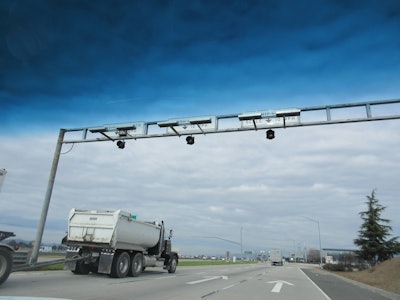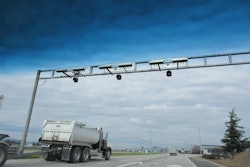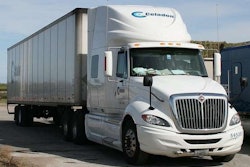 Connecticut Gov. Ned Lamont laid out his plan for trucks-only tolls at 12 bridges in the state, while the lawsuit over trucks-only tolls in Rhode Island is headed back to federal court following an appeals court ruling.
Connecticut Gov. Ned Lamont laid out his plan for trucks-only tolls at 12 bridges in the state, while the lawsuit over trucks-only tolls in Rhode Island is headed back to federal court following an appeals court ruling.A new proposal from Connecticut Gov. Ned Lamont released Friday, Dec. 6 outlines his plan to fund the state’s transportation budget with tolls aimed at heavy trucks. His announcement came on the heels of a court ruling that allows the lawsuit over Rhode Island’s truck-only tolls to proceed in federal court.
In a letter to state legislative leaders of both parties, Lamont, a Democrat, calls for trucks-only tolls on 12 bridges along major thoroughfares in the state. Rates would vary by location and whether drivers have an E-ZPass or have their plates registered in the state, but truckers could be charged between $6.40 and $19.20 at each of the 12 toll locations. The plan follows months of back-and-forth between Democrats and Republicans on transportation funding in the state.
Lamont, who was elected in 2018, campaigned on using trucks-only tolls to help fund transportation projects, but he backed off of the plan due to questions about whether such tolls would generate enough revenue, as well as ongoing legal challenges to Rhode Island’s tolls.
In November, he proposed his CT2030 transportation funding plan, which included plans to toll both cars and trucks. But state Democrats, who control both chambers of the state legislature, were not keen on tolling constituents and countered with a plan for trucks-only tolls. Republicans have come out against tolls altogether, instead proposing to use the state’s budget reserves to free up cash flow for transportation and highway projects.
Joe Sculley, president of the Motor Transport Association of Connecticut, says the tolls will harm the state’s economy and would directly affect intrastate truckers most.
“This is freight that is directly part of Connecticut’s economy,” Sculley says. “So this is a proposal to tax the freight while it’s on the way to the marketplace, where it will then be taxed again when the consumer or end-user makes their purchase. For all the talk about out-of-state trucks, [data] shows that truck-only tolls will be merely another blow to our state’s economy.”
Sculley says MTAC remains opposed to tolls on existing infrastructure and that litigation “is a definite possibility” if trucks-only tolls are passed and signed into law.
Opponents of truck tolling scored a small victory in court last week when a U.S. Court of Appeals ruled that the American Trucking Associations’ lawsuit over Rhode Island’s trucks-only tolls could be heard in a federal court. A district court ruled in March that Rhode Island’s tolls were considered taxes under the Tax Injunction Act, which states that federal courts do not have jurisdiction over state taxes. ATA’s lawsuit argues that the tolls discriminate against interstate trucking companies and are unconstitutional because they “impede the flow of interstate commerce.”
Gov. Lamont says he is “confident that the legal arguments [in favor of] truck tolls will prevail.”
“The ruling says nothing about the strength of the underlying legal challenge to trucks-only tolls, which far from being a burden on interstate commerce are a commonsense way to benefit that commerce by asking the in- and out-of-state commercial trucks that do the most damage to our roads to pay their fair share of maintenance and congestion mitigation projects,” Lamont adds.












